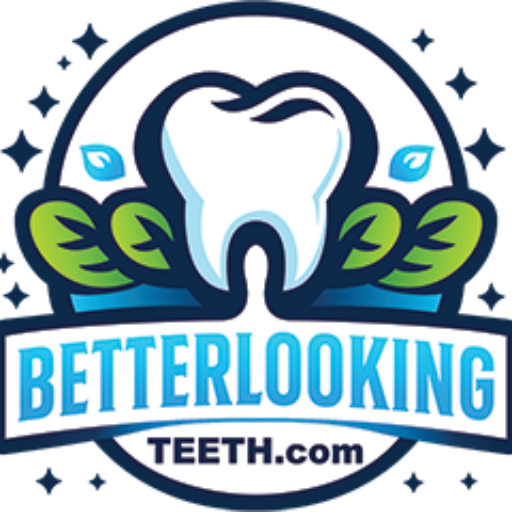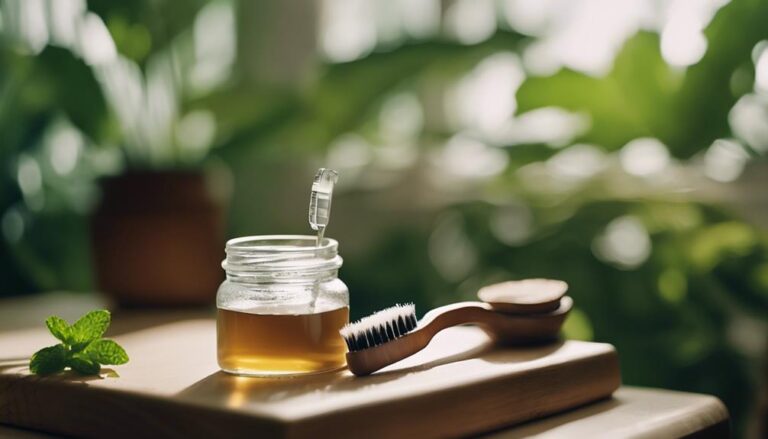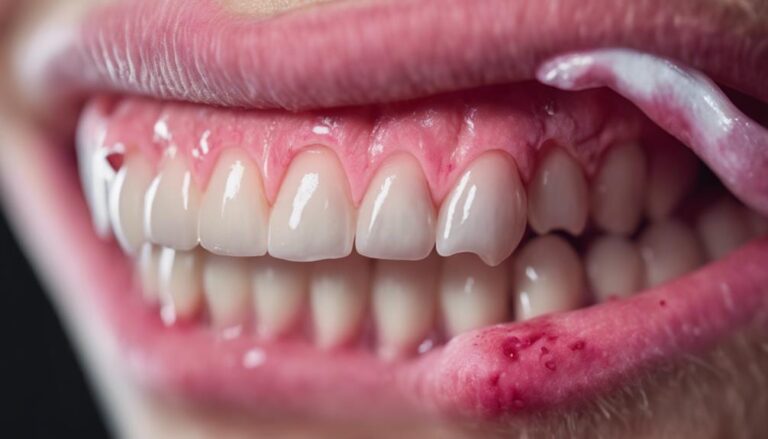Maintaining good oral hygiene is vital in preventing bad breath and gum disease. I brush my teeth using circular motions at a 45-degree angle for two minutes, floss daily, and use mouthwash to complement my routine. Regular dental check-ups are essential for early issue detection. Hydration plays a role in oral health too. Staying informed about plaque build-up and proper oral care practices is advantageous. Don’t forget the importance of saliva in cleansing and preventing tooth decay. There are many factors to take into account for fresh breath and healthy gums.
Key Takeaways
- Proper oral hygiene, including brushing and flossing, prevents bad breath and gum disease.
- Regular tongue scraping helps eliminate bacteria that cause bad breath and gum issues.
- Maintaining adequate saliva flow through hydration reduces the risk of bad breath and gum disease.
- Professional dental check-ups aid in early detection and prevention of gum disease.
- Managing stress and staying hydrated contribute to overall oral health and prevent gum disease.
Importance of Oral Hygiene
Maintaining good oral hygiene is essential for preventing bad breath and gum disease. One vital aspect often overlooked is tongue scraping. The tongue harbors bacteria that can contribute to halitosis. By gently scraping the tongue’s surface with a tongue scraper, you can effectively remove these bacteria, reducing the likelihood of bad breath.
Halitosis, or bad breath, can stem from various causes. Poor oral hygiene, leading to the buildup of plaque and bacteria in the mouth, is a primary culprit. Additionally, certain foods like garlic and onions, as well as habits like smoking, can result in persistent bad breath. Dry mouth, often induced by medications or mouth breathing, can also contribute to halitosis by reducing saliva flow that normally helps cleanse the mouth.
Brushing Techniques for Health
To guarantee excellent oral health, mastering proper brushing techniques is essential. Brushing techniques involve more than just scrubbing your teeth; it requires proper form to make sure thorough cleaning. Start by holding your toothbrush at a 45-degree angle against your gums and using gentle circular motions to clean each tooth’s front and back surfaces. Remember to brush for at least two minutes to reach all areas effectively. Pay special attention to the gum line, where bacteria often accumulate, causing gum disease.
Proper brushing techniques are vital for preventing gum disease, but they’re only part of a complete oral hygiene routine. Flossing is another critical component. To complement your brushing routine, floss at least once a day to remove plaque and food particles from between your teeth. When flossing, curve the floss against each tooth and move it up and down to clean below the gum line. By mastering both brushing and flossing techniques, you can greatly reduce the risk of gum disease and maintain excellent oral health.
Flossing: Key to Gum Health
Flossing plays an important role in maintaining excellent gum health and preventing gum disease. Proper flossing techniques are essential for removing plaque and debris from areas where your toothbrush can’t reach. To floss effectively, use a piece of floss about 18 inches long, winding the ends around your fingers for better control. Gently slide the floss between your teeth, curving it against one tooth and moving it up and down to clean the sides. Repeat this process for each tooth, making sure to floss below the gum line as well. The benefits of flossing include reducing the risk of gum inflammation, cavities, and bad breath. By incorporating flossing into your daily oral hygiene routine, you can greatly improve your gum health.
When it comes to gum health tips and tricks, consistency is key. Floss at least once a day, preferably before brushing your teeth, to guarantee a thorough clean. Remember, healthy gums are the foundation of a healthy smile.
Mouthwash Benefits and Usage
Gum health goes beyond flossing; exploring the benefits and proper usage of mouthwash can further enhance your oral hygiene routine. Using mouthwash correctly can help reduce plaque, prevent cavities, and freshen breath. Here is a table outlining the benefits and proper usage of mouthwash:
| Mouthwash Benefits | Proper Usage |
|---|---|
| Reduces plaque buildup | Dilute as directed |
| Prevents cavities | Swish for 30 seconds |
| Freshens breath | Avoid eating/drinking after use |
| Fights gum disease | Use after brushing |
| Alcohol-free options available | Spit out after use |
It’s essential to follow the instructions on the mouthwash label for the best results. If you prefer natural options, consider mouthwashes containing essential oils like tea tree or peppermint. These can provide similar benefits without artificial additives. Remember, while mouthwash can be a valuable addition to your oral care routine, it should not replace brushing and flossing.
Regular Dental Check-ups
Regular dental check-ups are essential for maintaining excellent oral health and preventing potential issues. As a dentist, I emphasize the importance of these routine visits not only for addressing existing problems but also for preventing future complications through proactive care.
- Early Detection: Regular dental check-ups allow for the early detection of any dental issues, such as cavities, gum disease, or oral cancer. Timely identification of these problems can lead to more effective treatment and better outcomes.
- Professional Cleaning: During these visits, a dental hygienist will thoroughly clean your teeth, removing plaque and tartar buildup that regular brushing and flossing may miss. This professional cleaning helps prevent issues like cavities and gum disease.
- Personalized Advice: Dentists can provide personalized advice on dental hygiene practices and preventive care tailored to your specific needs. This guidance can help you maintain excellent oral health between visits and reduce the risk of developing problems in the future.
Healthy Diet for Oral Health
Maintaining a nutritious diet plays an important role in promoting excellent oral health and preventing dental problems. When it comes to oral health, one essential aspect to think about is sugar intake. Sugary foods and drinks can lead to tooth decay and gum disease by providing fuel for harmful bacteria in the mouth. Therefore, limiting the consumption of sugary snacks and beverages can greatly contribute to a healthier mouth.
In addition to watching sugar intake, incorporating probiotic foods into your diet can also benefit your oral health. Probiotics are known to help balance the levels of good and bad bacteria in the gut, which can have positive effects on oral health as well. Yogurt, kefir, sauerkraut, and other fermented foods are excellent sources of probiotics that you can easily include in your daily meals.
Avoiding Tobacco Products
To promote excellent oral health and reduce the risk of dental issues, it’s important to steer clear of tobacco products. Tobacco not only causes bad breath but also greatly increases the likelihood of developing gum disease and oral cancer. Here are some reasons why avoiding tobacco products is critical:
- Nicotine Addiction: Tobacco products contain nicotine, a highly addictive substance that can make it challenging to quit smoking or using other forms of tobacco. Nicotine addiction not only harms your overall health but also has detrimental effects on your oral cavity, leading to various oral health problems.
- Increased Risk of Gum Disease: Tobacco use weakens the immune system, making it harder for the body to fight off infections, including gum disease. Smoking or using smokeless tobacco can cause gum inflammation, gum recession, and eventually lead to tooth loss if not addressed promptly.
- Importance of Tobacco Cessation: Quitting tobacco products is essential for improving not only your oral health but also your overall well-being. Seeking support from healthcare professionals or cessation programs can greatly increase your chances of successfully quitting tobacco and maintaining excellent oral hygiene.
Hydration for Fresh Breath
Staying adequately hydrated is essential for maintaining fresh breath and overall oral health. Hydration is one of the key fresh breath secrets and hydration tips that can have a substantial impact on gum disease prevention and water intake. Water helps to wash away food particles and bacteria that can lead to bad breath and plaque buildup, which is a major contributor to gum disease. When the mouth is dry, it creates an environment where bacteria thrive, leading to oral health issues.
Optimal water intake varies for individuals, but a general guideline is to aim for at least eight 8-ounce glasses per day. However, factors such as physical activity level, climate, and overall health can influence the necessary intake. In addition to water, foods with high water content, such as fruits and vegetables, can also contribute to hydration levels.
Incorporating proper hydration into your daily routine is a simple yet effective way to maintain fresh breath and support gum disease prevention. Remember, a well-hydrated body leads to a well-hydrated mouth, promoting overall oral health.
Stress Management Impact
Proper stress management plays a significant role in oral health and can impact conditions like bad breath and gum disease. Stress relief techniques are invaluable tools in maintaining overall well-being, including oral health. Here are some key points to keep in mind:
- Regular Exercise: Engaging in physical activity helps reduce stress levels, which can in turn lower the risk of developing gum disease and bad breath.
- Mindfulness Practices: Techniques such as meditation and deep breathing exercises can aid in stress reduction, benefiting both mental health and oral health.
- Healthy Lifestyle Choices: Eating a balanced diet, getting enough sleep, and maintaining good oral hygiene are all interconnected with stress management and can contribute to preventing oral health issues.
Understanding the mental health connection and implementing effective stress relief techniques can lead to improved overall health, reducing the likelihood of experiencing conditions like bad breath and gum disease.
Proper Tongue Cleaning
Have you ever considered the importance of cleaning your tongue for maintaining peak oral health? Proper tongue cleaning plays a vital role in preventing bad breath and gum disease. Tongue scraping is a simple yet effective method to enhance tongue hygiene and overall oral health.
When we neglect cleaning our tongues, bacteria, dead cells, and food debris can accumulate on its surface, leading to bad breath and contributing to the development of gum disease. These accumulations can also result in a white coating on the tongue, which isn’t only unpleasant but also a sign of poor oral hygiene.
Regularly scraping your tongue removes these unwanted deposits, improving not only your breath but also reducing the risk of gum disease. Incorporating tongue scraping into your daily oral care routine can make a significant difference in your overall oral health. Remember, a healthy mouth starts with proper tongue hygiene.
Understanding Plaque Build-up
Neglecting proper tongue cleaning can lead to the accumulation of plaque on teeth and gums, which is a breeding ground for harmful bacteria causing various oral health issues. Understanding plaque build-up is vital for maintaining good oral hygiene.
Here are some key points to keep in mind:
- Plaque prevention: Regular brushing and flossing are essential to remove plaque from the teeth and gum line. Using antimicrobial mouthwash can also help reduce plaque buildup.
- Tartar control: Plaque that isn’t removed can harden into tartar, which requires professional cleaning by a dentist or dental hygienist. Tartar can lead to more serious oral health problems if left untreated.
- Oral bacteria and gum inflammation: The bacteria in plaque can irritate the gums, leading to inflammation and potential gum disease if not addressed promptly. Proper oral hygiene practices are essential in preventing the progression of gum inflammation and maintaining healthy gums.
Taking proactive measures to prevent plaque buildup is key to preventing bad breath, gum disease, and other oral health issues.
Importance of Saliva Production
Saliva plays an important role in maintaining oral health by helping to cleanse the mouth and neutralize acids that can cause tooth decay. Adequate saliva production is essential for a healthy mouth, as it contains enzymes that aid in digestion and protect the teeth from decay. Factors such as diet balance and hydration levels can greatly impact saliva production.
| Importance of Saliva Production | Effects on Oral Health |
|---|---|
| Cleanses the mouth | Prevents tooth decay |
| Neutralizes acids | Helps in digestion |
| Protects teeth | Maintains oral pH balance |
| Aids in food breakdown | Reduces bad breath |
Maintaining a balanced diet rich in fruits and vegetables can promote saliva production, while adequate hydration levels are also important. Poor saliva production can lead to dry mouth, increasing the risk of bad breath and gum disease. Therefore, paying attention to diet and staying hydrated is crucial for promoting saliva production and overall oral health.
Oral Care Products Selection
Choosing the right oral care products is vital for maintaining excellent oral health and preventing issues such as bad breath and gum disease. When selecting oral care products, it’s essential to take into account various factors to make sure they’re effective and safe for daily use. Here are some key points to keep in mind:
- Product Effectiveness: Look for products that are clinically proven to be effective in preventing bad breath and gum disease. Check for ingredients like fluoride for cavity prevention and antibacterial agents for fighting plaque.
- Brand Reputation: Choose products from reputable brands with a history of producing quality oral care items. Trustworthy brands often invest in research and development to offer advanced solutions for oral health.
- Ingredient Safety, Price Comparison: Prioritize products with safe ingredients that don’t cause irritation or allergic reactions. Additionally, compare prices to ensure you’re getting the best value for your money without compromising on quality.
Impact of Medications on Oral Health
Understanding how medications can impact oral health is vital for maintaining overall well-being and addressing potential dental issues effectively. When considering medication effects on dental health, it’s important to be aware of possible drug interactions that could affect oral care routines. Some medications may lead to dry mouth as a side effect, reducing saliva production and increasing the risk of tooth decay and gum disease. Additionally, certain drugs can cause gum overgrowth, making it challenging to maintain proper oral hygiene.
To provide a clearer picture, the table below outlines common medication effects on dental health and potential drug interactions related to oral care:
| Medication Effects | Oral Care |
|---|---|
| Dry mouth | Use saliva substitutes and stay hydrated. Avoid sugary drinks. |
| Gum overgrowth | Regular dental check-ups to monitor and address any changes. Proper brushing and flossing techniques. |
Being mindful of how medications can impact oral health is an important step towards preserving a healthy smile and preventing dental complications.
Professional Cleanings and Treatments
Regular professional cleanings and treatments play a crucial role in maintaining excellent oral health and preventing dental issues. These routine visits to the dentist are essential for ensuring your teeth and gums stay healthy in the long term. Here are some key benefits of professional cleanings and treatments:
- Gum Disease Prevention: Professional cleanings help remove plaque and tartar buildup, reducing the risk of gum disease. Additionally, dentists can identify early signs of gum disease and provide necessary interventions to prevent its progression.
- Deep Cleanings: In cases where there’s a significant buildup of plaque and tartar, deep cleanings may be recommended. These cleanings, also known as scaling and root planing, target the removal of bacteria from below the gumline, promoting gum health and preventing further oral issues.
- Bad Breath Treatment and Professional Advice: Dentists can offer tailored advice on how to combat bad breath effectively. They can identify the underlying causes of halitosis and provide treatments to address the issue at its source. Professional cleanings also help eliminate bacteria that contribute to bad breath, ensuring a fresh and healthy mouth.
Frequently Asked Questions
Can Genetics Play a Role in Causing Bad Breath and Gum Disease?
Genetic factors can influence the likelihood of bad breath and gum disease. While genetics play a role, lifestyle habits like proper oral hygiene and regular dental check-ups are essential in preventing these conditions.
How Does Hormonal Changes in Women Affect Oral Health?
Maintaining good oral hygiene is essential for women as hormonal changes during menstruation can increase the risk of gingivitis. Regular brushing, flossing, and dental check-ups help manage these effects and promote overall oral health.
Is There a Connection Between Bad Breath and Sinus Issues?
Ah, the sinus, a mysterious gateway to both fresh air and potential breath woes. Sinus health can indeed impact bad breath. Maintaining proper oral hygiene and addressing sinus issues can help combat halitosis.
Can Certain Medical Conditions Lead to Chronic Bad Breath?
Certain medical conditions, like sinus infections or diabetes, can contribute to chronic bad breath. Genetic factors may also play a role. Proper oral hygiene and regular dental check-ups can help prevent gum disease, which can worsen bad breath.
Are There Specific Foods That Can Worsen Bad Breath and Gum Disease?
Eating sugary foods and neglecting dental hygiene can worsen bad breath and gum disease. Making healthier dietary choices and maintaining good oral health habits are essential in preventing these issues. Lifestyle choices directly impact oral health.
Conclusion
To sum up, maintaining good oral hygiene is like building a strong foundation for a house – it’s vital for overall health.
By incorporating proper brushing techniques, regular flossing, and using mouthwash, you can prevent bad breath and gum disease.
Don’t overlook the importance of regular dental check-ups and professional cleanings to guarantee your oral health is in top shape.
Remember, a healthy smile is a key to a healthy body.






